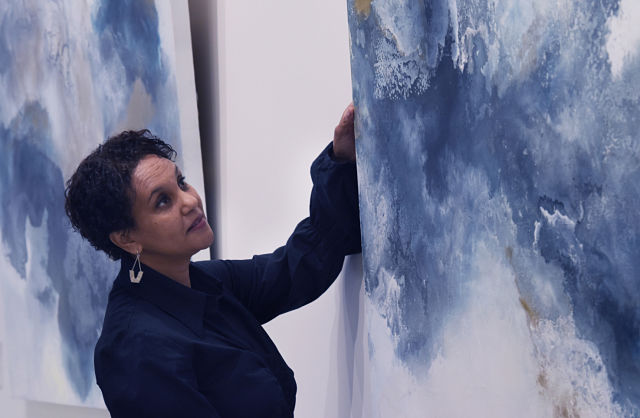 Desta Gallery owner Emebet Korn arranges a piece on display at her gallery in Mill Valley, California. (Marin Independent Journal)
Desta Gallery owner Emebet Korn arranges a piece on display at her gallery in Mill Valley, California. (Marin Independent Journal)
Marin Independent Journal
When Emebet Korn moved to San Anselmo from San Francisco more than 20 years ago, then pregnant with her daughter, she dreamed of opening a gallery in town. She imagined a place to highlight emerging and established artists — especially from the Bay Area — offer receptions and events, and foster a greater community.
Although it took more than a decade, she made the leap and opened Desta Gallery in San Anselmo — the name means joy in Amharic, the Ethiopian-born Korn’s native language — nearly seven years ago.
Then, in the middle of a pandemic, she closed the San Anselmo location and re-opened it in September in Mill Valley, at 100 Throckmorton Ave.
Her experiences as a design consultant and the owner of a high-end women’s apparel line, as well as her philanthropic background co-founding a nonprofit that served her home country, help inform her contemporary-focused gallery, where she offers art consultancy, hand-delivers artwork and showcases exhibits.
Q What made you want to move the gallery to Mill Valley?
A The culture of Mill Valley. They support the arts, be it fine art, the Tuesday ArtWalks, the film festival, Mill Valley Fall Arts Festival and more. The Mill Valley Chamber of Commerce is very active with supporting businesses, and also what attracted me is being close to the city, so that people from all over the Bay Area visit.
Q With everything that’s gone on this year, what it’s like being a woman gallerist of color in Marin?
A I have only had people be supportive of me and my business. I definitely feel vulnerable, thinking all these thoughts that I have never thought about before, like are people seeing me as this Black person, or just another immigrant? It’s mindboggling why there’s such separation. We are in 2020, people should not be thinking this way. This is not something I was raised with. I went to an international school where everyone was from all over and we played with each other as one. My children are interracial. I feel very strongly that it’s important to see people for who they are, not their skin color.
Q Growing up in Ethiopia, were you interested in art?
A I have been passionate about art all my life. Since a young age, I’ve loved drawing, painting, anything creative. I came here from Ethiopia and studied fashion design and art.
Q What does the gallery name mean to you?
A It reflects on what I do, besides loving the creative world and wanting to support artists, working with clients, helping them find their voice and bringing joy to them. When a client buys a painting, and it’s a right fit, if you look at their eyes, they are twinkling, the spirit is lifting up. That’s why I am in this. Art reaches deep inside our souls and connects us to our deeper emotions, feelings and perceptions. Also, I introduce my clients to artworks that challenge them. I feel works that offer some resistance are often the ones that provide expansion and self-discovery.
Q What’s it been like having to navigate COVID?
A At the beginning of COVID, it was a little bit shocking to have to close your business, then now what, and I went into reflection, a lot of meditation and a lot of time thinking about it and how should I proceed. As time passed, what I realized is yes, we are in difficult times, but that doesn’t stop us from still enjoying the good things in our lives. Instead of dwelling on the difficulties, also reflect on the positives that are surrounding us. I decided to keep forging ahead, as long as I am doing it the safest way, and I am. It’s not a bad thing to go to galleries and look at art, even if you don’t buy anything at this time. Just be inspired and it’s good to refresh your spirit.
—
Join the conversation on Twitter and Facebook.

























